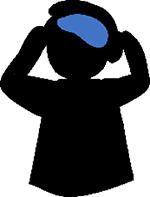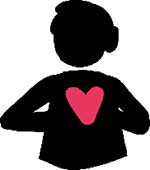Table 2.
Summary of themes from ‘3H’ activity examining impact of trauma on thoughts, emotions and behavior at first and last session
| BASELINE (n = 31) | FINAL SESSION (n = 19) | |||||
|---|---|---|---|---|---|---|
| Themes | Cases (n) | Illustrative quotes | Themes | Cases (n) | Illustrative quotes | |
Head (Thoughts)
|
Self-doubt, self-criticism, regret | 29 | “I blamed myself.” “I thought something was wrong with me.” | Less rumination, self-doubt, worry | 13 | “I have learnt not to overthink things.” “I don’t think about the trauma anymore.” |
| Fear, mistrust | 11 | “I didn’t trust men.” “I thought the world was not safe.” | Positive thinking, hope, self-esteem | 9 | “I’m learning to love myself.” “There’s absolutely nothing wrong with me.” | |
| Persistent worry, rumination, wondering why | 11 | “I was always thinking too much.” “I would think ‘why me?’” “I asked questions that had no answers.” | Motivated for positive change, focused on future | 8 | “I’m thinking of how I can best take care of my health.” “I have learned avoidance can undermine HIV care.” | |
| Hurting self or others, aggression | 8 | “I thought of killing myself.” “I would have the desire to hurt others.” “I became very aggressive.” | Still ruminating, doubting self | 5 | “I still think a lot about the abuse from my ex-boyfriend.” | |
Heart (Emotions)
|
Sad, empty, unloved, hopeless | 30 | “I would feel sad all the time.” “I would hurt so much.” | Content, loved, healed, happy | 17 | “I now have peace within me.” “Less burdened by trauma.” |
| Anger | 21 | “Angry at everybody.” “I would want to hurt them first instead of them hurting me.” | Confident, trusting, clear-headed | 10 | “I know that it happened, but I feel that it shouldn’t worry me.” “My confidence is back.” | |
| Fearful, nervous, no trust | 18 | “Scared that he might do it again.” “I couldn’t trust men, even my brother.” | Still sad, angry, fearful, ashamed | 5 | “I still feel angry” “I still blame my family.” “Still scared of men.” | |
| Guilt, regret, shame | 13 | “Felt like everybody knew what happened to me.” “I blamed myself.” | ||||
Hands (Behavior)
|
Damaged important relationships | 23 | “Relationship with my parents was compromised.” “Stopped phoning my family” | Seeking/ repairing relationships | 12 | “I changed the way I speak and talk with people.” “Now I know what kind of relationship I want to have.” |
| General social isolation, distance | 22 | “I shut down and kept in the house, scared to be around people.” | Less reactive, less angry | 10 | “I no longer bully people and my temper is more manageable” | |
| Outward anger, temper, lashing out | 16 | “I find it difficult to control my temper and always lash out.” | Opening up, more trusting | 8 | “I’m learning to open up to people and learning to trust people.” | |
| Mistrust, suspicion of others | 13 | “I used to not trust people.” “Do not trust men.” | More goal-focused, motivated, active | 8 | “I work with determination and don’t put HIV in my way.” “I’m able to change the stressors that I have.” | |
| Blame others for not protecting her | 9 | “I would blame my family for not rescuing me.” | ||||
Note. n = number of cases where theme was present. ‘3H’ graphics used with permission from Sikkema et al. (2017).
